Editor’s Note:
Long-term expats most likely know the author, Jeff Schinsky, thanks to his ongoing efforts in the Expats Without Agendas Facebook Group. It’s one of the few Facebook groups that we recommend for new expats too. Jeff’s prior experience helping expats find rentals is truly valuable and we are grateful for his contribution. Don’t forget to read Part 2 (Evaluating the Property) and Part 3 (Lease Considerations). Enjoy!
One thing you can say about us expats, is that we tend to move a lot. Sometimes the owners start getting difficult, or maybe we just want to experience a different part of town. But for whatever reason, we move. I should know, as I’ve done it seven times in nine years! On a few occasions, I just needed something different for personal or family reasons. On a couple of other occasions, I simply chose poorly and realized that I’d made a mistake. In almost every case, there were both good and bad things about each location. The one constant on each and every choice was that the home I chose was set in a particular neighborhood! And each and every time, that neighborhood made a significant difference in the degree to which I enjoyed living there.
One thing I’d like to get out of the way is “zoning.” It may exist here, but it doesn’t appear to be widely enforced. It would seem that almost any sort of business can move in anywhere, including right next door to you! In general, the more affluent neighborhoods like Puertas del Sol and El Vergel seem to have the necessary collective influence to keep undesirable businesses out of the area, but my point is this: you cannot rely on zoning here. Rather, you have to know certain things to look for, or to look out for! That’s what we’ll cover in this article.
A few years ago, I spent a fair period of time helping other expats find new homes. During that time, I got to see a lot of Cuenca properties. In the process, I learned quite a bit about first checking out the neighborhood and deciding whether or not it was one in which I’d care to live. And it was also during this time that I learned that many, many expats move from one home to another for one reason in particular: Unanticipated noise! As such, much of this article will focus on noise issues.
I know a handful of great rental agents in Cuenca, but if they’ve never lived outside of Ecuador, they really don’t understand the needs and desires of most expats. Let’s face it – it’s obvious that Ecuadorians have a much higher tolerance for noise than most foreigners do. In short, many of them seem oblivious to the late-night cacophony coming from so many different and unexpected sources. But what does the agent or the owner of a home inevitably say when you’re considering their property, and you ask if the area is quiet? “Oh, it’s ¡muy tranquilo!” But is it?
Well, perhaps to them it is! But you cannot rely on other people to tell you which area or neighborhood is right for you – you have to do your own homework and reconnoitering to establish that for yourself! I know, I know. You probably just found the perfect house. It checks every box, and you feel pressured to go ahead and sign that lease before someone else steals it from under you. That’s when you need to slow things down a little and evaluate the area surrounding that property.
The truth is, any given neighborhood can appear to be perfect, but appearances can be deceiving. So resist that pressure to immediately sign on the dotted line until you’ve had a chance to scope out the neighborhood!
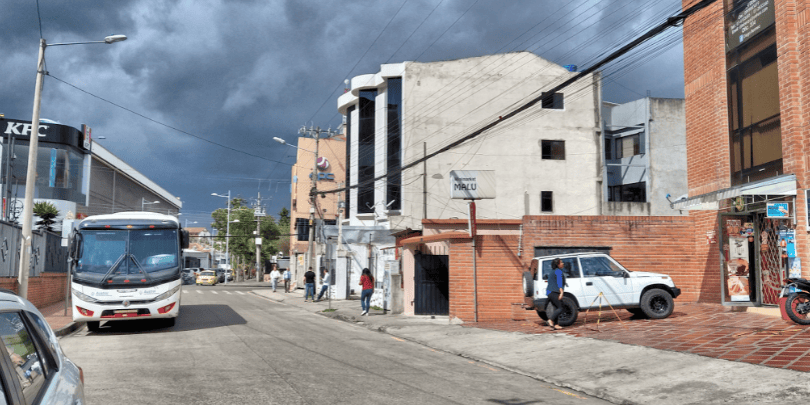
Choosing a neighborhood is not an obvious thing either! For instance, I live smack in the middle of a heavily commercial area (shown here in the photo), but it’s also the quietest home I’ve ever lived in Cuenca! How can that be? Well, in my case, the house sits 60 meters back from the main street, and it’s surrounded on one side by a parking lot that’s closed at night, by a business building that is closed on evenings and weekends, and by a couple of residential properties that have mercifully proven to be occupied by other peace-loving individuals. In short, I don’t have much of a view at all, but I have tranquildad!
Remember that the precise physical location of a given home can make all the difference in the world, so never judge a book by its cover, especially when choosing a home here.
Nothing, however, is foolproof, and this article cannot possibly address everything you might encounter – but it’s as close as I can get! And every story/example in this article is based on actual events from my own personal experience, and from the many accounts I’ve heard from other expats. So if you use the information in this article the next time you go house-hunting in Cuenca, I honestly believe your chances of finding “tranquilo” will be far greater, and you’ll enjoy that home a whole lot more. Keep in mind that there are many other reasons (apart from noise) to suddenly regret having moved into a particular neighborhood, so I’ll try to address as many of those issues as I can in this article.
With that said, let’s get into our selection criteria!
Parks
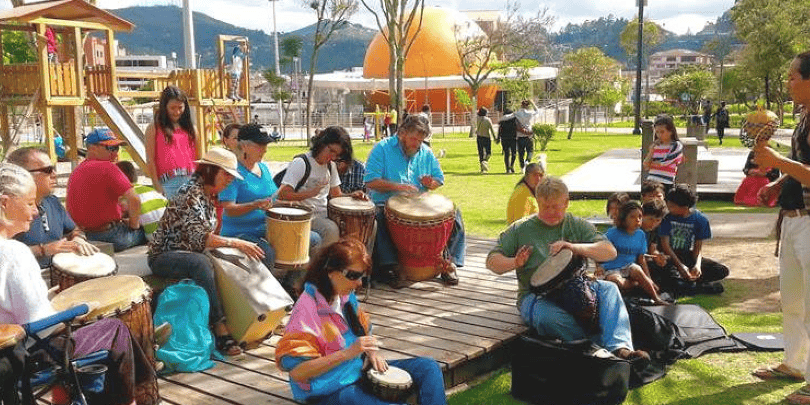
Who doesn’t love having a park across the street? It’s a great place to take a stroll, catch some rays, walk the dog, attend a drum circle, etc. But not all parks in Cuenca are created equal. The main thing you have to be concerned about in most Cuenca parks is Zumba. Zumba (known here as bailoterapia, or “dance therapy”) is essentially a form of aerobics exercise that is held in designated parks all over Cuenca.
Bailoterapia typically starts at roughly 8 PM and goes for an hour or so. Some other parks do it in the mornings instead, starting as early as 6:30 AM. We’re talking about very loud music, plus the session leader calling out moves over a large speaker. Depending on how close you are to the park, it can be very loud and disruptive. I’ve made the mistake of living too close to two of them, so mine is the voice of experience.
One other concern with parks is that, during Ecuadorian festivals and for neighborhood-specific celebrations, it’s not unusual for a large stage to suddenly pop up and send out a wall of window-rattling and denture-dislodging music. These events can run several days at a time, and last right up until 2 AM or later.. But these events are usually spaced out over the year, and they are largely predictable as to when they’ll happen, so I personally would not use that to rule out a specific home that I was really interested in renting.
So which parks have bailoterapia? That’s the million-dollar question! There are a few internet sites and at least one municipal Facebook page where you can find parks and other locations with bailoterapia. The only problem is that all of that can (and does) change. Ultimately, it will be up to you to ask the owner, the agent, or the neighbors about any nearby park, and whether or not they hold bailoterapia there. You’ll also want to know what hours of the day or night it’s held there. If you can’t get a straight answer from anyone, consider returning in both the evening and morning to check it out for yourself.
This isn’t to say that living near a park is always a bad thing, but you should ask potential future neighbors about what goes on there so that you’re not surprised. And who knows? – maybe you’ll want to go to bailoterapia yourself! I know expats who do!
Churches
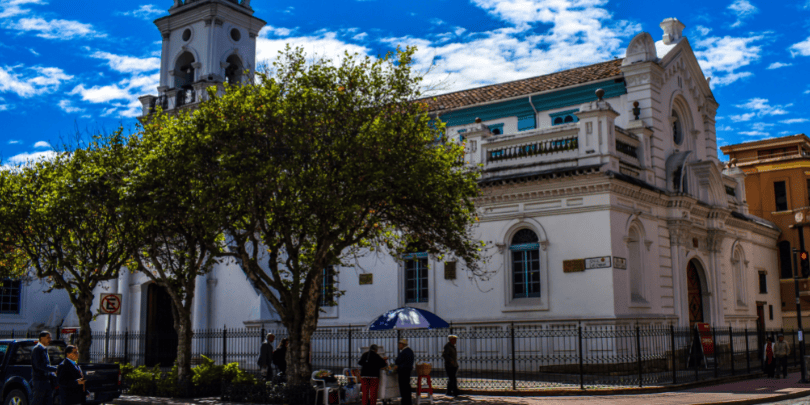
Many of the larger Catholic churches also have large bells, which can start ringing very early on Sunday mornings, or potentially at random times on various holidays, after weddings, and on other special occasions.
Related to this, it’s not unusual to see and hear parades and other events that originate from a local church, and then wind their way through the neighborhood. But if you’re an early riser, the bells probably won’t bother you, and the parades are usually very colorful and offer a nice slice of local culture.
Also, with many Catholic churches, you’ll often find they have a small plaza out front, or perhaps a basketball court or other spaces that can suddenly be transformed into “ground zero” for fireworks enthusiasts. And if you’ve lived here for a while, you’ll know that fireworks do not require a special occasion! And even if you can handle frequent and unexpected fireworks yourself, try to keep in mind that your pets may not be quite so enthusiastic about them!
Then you have various Protestant and other churches spread throughout Cuenca. Some are larger and in areas where any external noise is absorbed by local traffic, but it’s typically the smaller, neighborhood-specific churches that make most of the noise. Some are held in houses or storefronts where you wouldn’t normally think to look, and it’s not at all unusual for them to go on for hours and hours. Some put big speakers outside the building and pipe the music and the sermon out for the surrounding public to “enjoy.” This can often be amplified to a point where it can reach for a block or two. I’ve personally known a handful of expat families who’ve had to move because they were too close to all the noise coming from a local church, so this is a very important issue to consider.
Just as I mentioned above regarding parks, you need to ask the agent, the owner, and ideally your potential-future neighbors if there are any nearby neighborhood churches. In this case, I would consider anything less than a full city block to be “too close.” If you have the luxury of waiting until the following Sunday, go back to the area you’re considering at around 8 – 10 AM and see what you can hear.
Schools

Schools that are too close to your home can usually mean that your days are going to be punctuated by a wide variety of noises and other potential inconveniences. First, most of the schools here operate in both morning and evening shifts, which means dozens upon dozens of parents are going to be driving or walking past your house at least four times per day, picking up and dropping off their kids. So if you’re not already an early riser, you soon will be if you choose to live near a school. Apart from the noise this brings, it’s also usually a traffic nightmare.
Then, all of a sudden you’ll find yourself surprised by something that sounds like a loud horn or a steam whistle, which is used instead of a bell to mark various points in the daily schedule. Aside from that, you’ll have the noise from the schoolyard during recess, phys-ed, soccer matches, etc. I used to live half a block from an elementary school, so this was my weekday soundtrack for nearly a year. For me, it was not the worst place I’ve lived regarding noise, but it’s high enough on the list to be worth mentioning.
One friend of mine lived in an apartment that overlooked a small private school. Besides the noises I already mentioned above, the school had near-daily band practice. And it wasn’t just during the day – they practiced on evenings and weekends, too. After spending a significant amount of money to try to soundproof his apartment on the school-facing side, he finally had to move elsewhere in order to get a full night’s sleep and to preserve his sanity. My general advice would be to live no closer than two to three blocks from any school in the city.
Vacant Lots
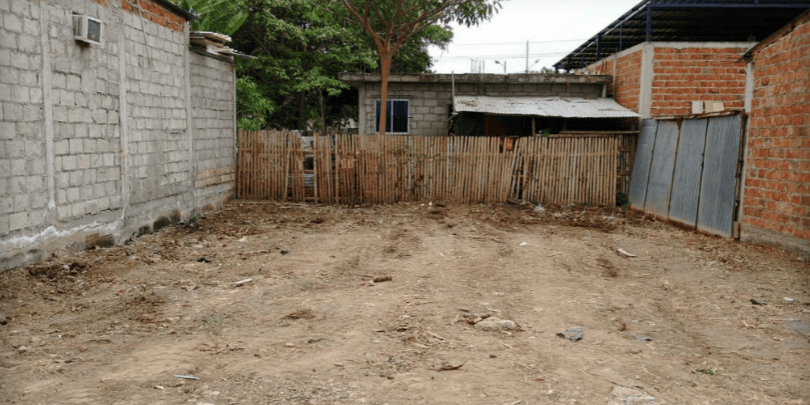
Don’t you just love that view of the Cajas from your apartment? Of course you do! That’s one of the reasons you chose that apartment! However, it’s quite possible you could lose that view if you were to choose a property directly across the street from a vacant lot, or an otherwise open area that could be used for construction. The main thing to remember is that most vacant lots do not remain vacant for very long!
Here’s what usually happens: You move into a quiet home, you have a great view, and then, all of a sudden, that view starts to disappear as construction begins on a high-rise apartment building, a new home, or new floors on an existing structure. It’s happened to me once, and I personally know a fair handful of other expats who’ve experienced the same thing. One day there’s this amazing view, and the next day it’s gone forever!
Or, the lot may not be directly across the street from you, but instead, be right next to you! And even the smallest of new buildings can take seemingly forever to finish. You can typically expect workers to make a variety of loud noises (plus the music from their boomboxes), all day long, from sun-up to sundown. Many times, the owner has limited funds and adds onto the structure very gradually. But If they do happen to have the money to build the new structure nonstop, you can still plan on at least 6- 18 months of non-stop banging, grinding, cutting, hammering, etc.
Just remember – anything can happen in a vacant lot, and it’s not always construction: It could end up becoming a soccer field or a volleyball court, both of which can get pretty rowdy. Or maybe the neighbor has chickens and a rooster! (Be aware that roosters crowing at dawn is a myth – here, they tend to start at around 4:00 AM.)
Construction Sites
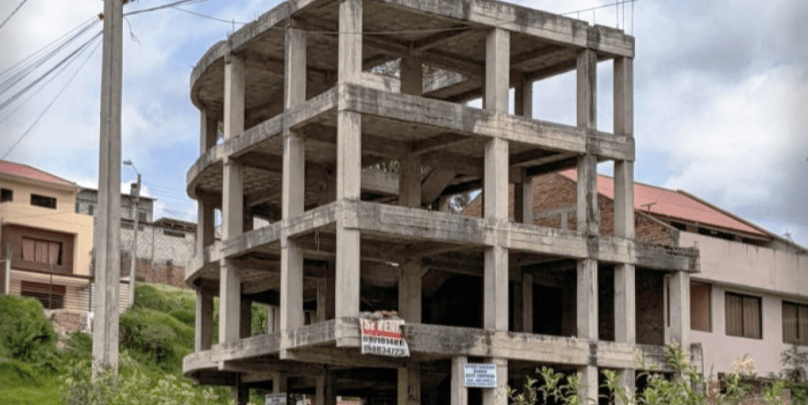
Related to vacant lots, construction sites are where something is already being built. First of all, you should seriously avoid renting an apartment in a building where that same building is not 100% complete! This is especially true if the unit you’re looking at is only one or two floors below where they’re still building. You’ll be dealing with non-stop noise, pervasive dust in the air (and on your furniture, belongings, your cat, etc.), filthy elevators, piles of building materials, etc. I’ve known many expats who’ve made this mistake, and most of them seriously regretted it.
The building shown in this photo currently seems to be abandoned, and nothing is happening there. But that means nothing here; I’ve seen construction suddenly resume on buildings in Cuenca that have been sitting dormant for seven or eight years! Never assume that a site like this is going to remain quiet and abandoned, because you never know!
Also, be aware that many active construction sites end up leaving expensive tools and equipment inside a fenced area surrounding the construction… along with two or three large dogs to scare off or “eat” potential intruders. So, you end up not only getting construction noise all day, but a couple of dogs that bark at their own shadows all night long. I’ve been there, and I’ve lived this story – it was not at all enjoyable.
So while dormant construction sites can remain dormant for years, construction can always suddenly resume without warning! My advice to you is that, if there’s an empty lot across from/next to you (or within a block of you), it’s better to keep looking. Of course, the owner will tell you that the lot has been abandoned for years and nothing will ever be built there, but that’s pure conjecture on his/her part.
Know Who Your Neighbors Will Be!
I know people who’ve lived next to an insanely loud machine shop, a “cuy ranch,” a cock-fighting establishment, karaoke bars, and other enterprises that generate very loud, annoying, and sometimes-disturbing sounds.
In the case of the cock-fighting enterprise next to my friends’ house, the location appeared to be a simple empty storefront with nothing going on there – until the first weekend came. That’s when the cock-fighting started there, and to say that my friends were horrified would be an understatement.
Another acquaintance found a beautiful, quaint apartment in el centro, and then a few months later a disco opened up next door. After a few months of trying to cope with deafening music going on until the wee hours, she finally had to give up her sweet apartment and move.
Your best bet in most neighborhoods is to look for things that are relatively “settled.” But that, I mean that it has things like tiendas and bakeries and nail salons, all of which appear to have been there for decades. The fewer empty properties there are, the better, because those are the ones that can suddenly be rented by someone who wants to open some new business and play his big speaker outside all day as a “marketing” tool. The more established and settled the area, the better your chances are of finding a nice tranquilo area in which to live.
Busy/Noisy Streets
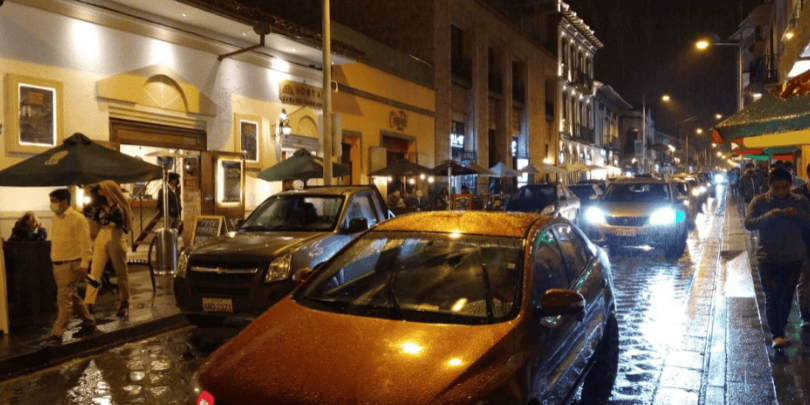
If the place you’re looking at is on-or-close to a major street, go into the property and ask everyone with you to “please stop talking” for a minute or two in order to find out what you can hear from outside. Keep the windows closed initially and then listen for traffic noise, dogs barking, car alarms, etc. Then, open those windows and listen for the same sounds, just to see if there’s a significant difference. Ideally, do this check from one or more of the bedrooms, the living room, or anywhere else in the property you’d like to not be assaulted by outside noise.
By the way, I still meet those who say “Oh, street noise doesn’t bother me,” or “I’m used to the racket from outside my apartment.” However, there’s research to suggest that, even if you’re able to consciously tune out street noise, your body cannot do so, and so it has to deal with a ton of subconscious stress due to the never-ending whine and hum. Look it up!
In general, avoid taking a home that faces a busy street with non-stop street noise. This includes motorcycles, large trucks, buses, and other unexpected sources of noise. Living farther up in a high-rise may help reduce your overall exposure to noise, but only if you’re in a newer building that has good, sound-blocking windows. But good windows are relatively rare here, so try the same test mentioned earlier, where you have everyone stop talking and you just listen.
Interestingly enough, some of the otherwise-nicest neighborhoods in Cuenca have hired security workers to wander the streets of your neighborhood all night long, regularly blowing a loud whistle to let would-be thieves know that someone is out there and watching the homes in the area. Can you say, “counterproductive”? Again, ask your would-be neighbors if that happens where you’re looking, and decide whether or not you could live with that.
So You Think You’d Like to Live in Cuenca’s Historic District?
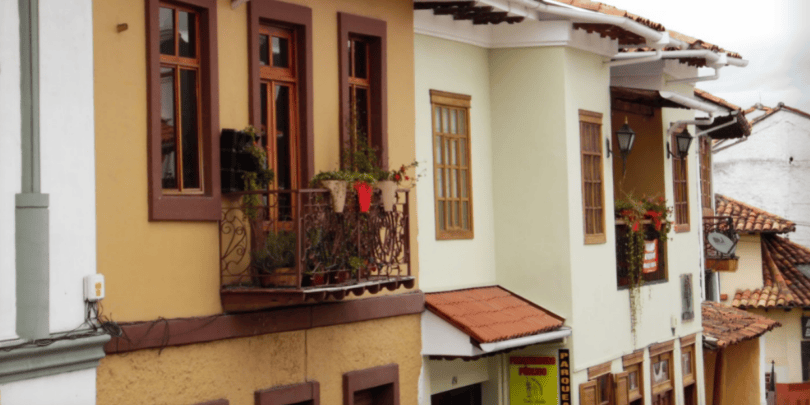
Some folks believe that the noise in the historic district would make it prohibitively loud to live there, but that does not have to be the case. It is true that you’ll need to look a little more carefully and take a lot more into consideration, but many expats live in and love el centro.
The first thing to consider is that the historic district is much larger than just the area surrounding Parque Calderón. If you keep going to the north and to the east, you’ll gradually find fewer businesses and more residential properties. Those areas can be much quieter and less busy, but the availability of quality rental properties there starts to get scarcer.
If you are planning on living in the historic center, your best bet is to look for something that is on the non-street-facing side of the building, and something that is not on a bus route. Those buildings down there are much larger than they appear from the outside, and go way, way back! If you look hard and long enough, there are some real hidden gems downtown!
Keep in mind that if you plan on having a vehicle here, very few homes in el centro have secure parking on-premises. There are, however, a variety of larger parking lots where you can rent a space by the month (average cost around $40). Additionally, if you’re bringing a container to Ecuador, you’ll likely have significant trouble finding a place in el centro that will accommodate your larger furniture and appliances, assuming that you can even get the stuff up the stairs!
New Living Opportunities with the Tranvía
As the majority of expats in Cuenca do not have personal vehicles. This has always made it more difficult to live in certain parts of town, simply because getting there was problematic.
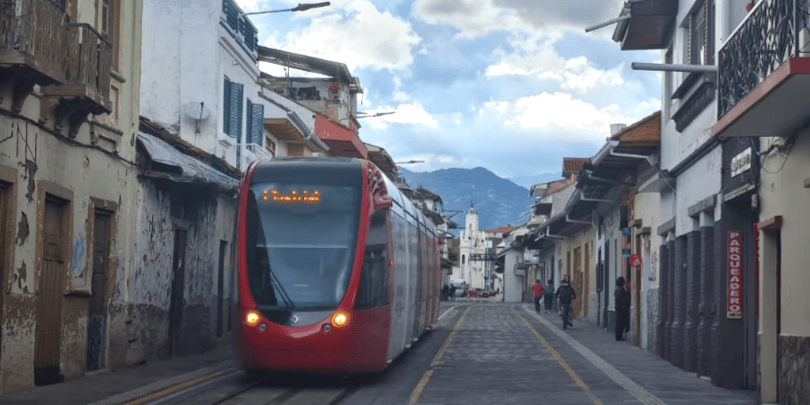
With the tranvía, the areas along western Las Americas and the western Primero de Mayo area are now just a short tram ride from the historic center. And if you’re 65 or older, you’re only looking at 17 cents per ride!
And don’t be too hasty to rule out these areas, because some of them are quite nice. Ciudadela de los Cantones, Las Colinas, plus a variety of homes and apartments are just off of Primero de Mayo in each direction, so there are a number of viable options out that way!
Feeling more adventurous? The tranvía will get you all the way out to Control Sur, where there are perfectly nice homes, sometimes at a much better price than you’d get if you lived where most other expats choose to live.
Living out in The Country (El Campo!)
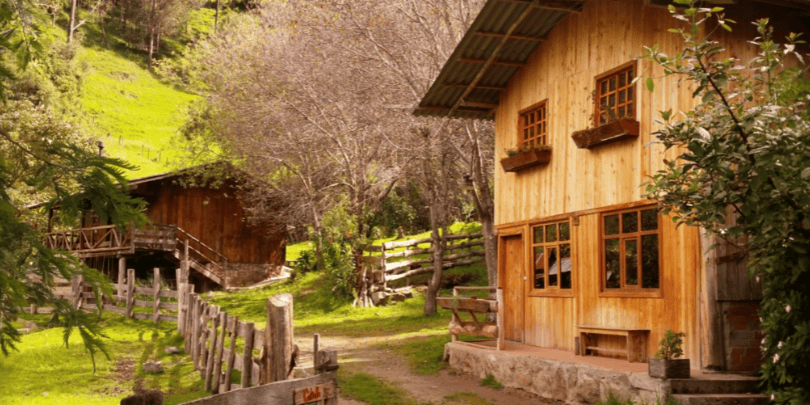
Ah, isn’t it nice to live in the country? Who doesn’t love the wide-open spaces, the great views, and the space between houses? Plus the large roving packs of dogs, shredding your trash bags; the mad cows and rambunctious roosters; squealing pigs and palm-sized spiders; slugs, mud, and cold; questionable or nonexistent security; etc. What’s not to love, right?
The realities of living in el campo here can vary widely, but all of the things I just mentioned are very real possibilities, if not probabilities. There are often issues with water pressure, water quality, internet service, etc. Also keep in mind that there are no sidewalks out in the country, so walking along the open road can be very dangerous from the cars and buses zooming through the countryside.
Then there’s the issue of transportation. Without their own vehicle, I’ve heard a number of expats tell me that they feel trapped and isolated “way out there,” and the majority eventually move back into town. There are usually bus lines, depending on exactly where you are, but the time-interval between buses is usually longer than in the city. As for taxis – assuming you can get a driver to come all the way out there – the fees can add up really fast! Also, though I was only a 5 – 8 minute drive outside of Cuenca, the city buses stopped about half-a-mile short of where I lived. Fortunately, I had my own vehicle.
In my time in el campo, I experienced everything I mentioned above, and more. I had no fence along one side of the property, but there was a deep and steep gully there. I thought that would keep intruders out. Wrong! I was sitting in my own house when a couple of kids started rattling the door knobs, trying to get in. Fortunately, they gave up quickly and moved on. Besides that, I regularly had strangers wandering across the property. Some brought their cows to graze in my front yard. I had old women with scythes cutting grass down at the bottom of the hill to take home and feed to their guinea pigs.
Then the dogs were horrible, and I had to go to extraordinary lengths to keep my trash bags out of their reach. Additionally, there was the ever-present mud that never dried because of the shade from the trees along that gulley. And every night I had to shake out all the blankets on my bed to make sure one of those big nasty spiders hadn’t crawled under the pillows or blankets. I also had a modern electric calefón; but there was never enough water pressure to make it work properly, I had no hot showers as I had been promised! As that last item turned out to be a lease “exaggeration” on the part of the owner, I was able to walk away after four months and get my deposit back.
Then the “quiet” of el campo? Nonexistent. Every day, two different farmers across two different fields would break out the giant speakers and crank them up so they would have competing music to work by while they were outside all day.. Overall, life out in el campo was probably at least as noisy as the city, and the type of noise generated was even less agreeable.
I do know of expats who live up on mountaintops and in other truly remote regions and really enjoy living there. So, it’s all a matter of what you’re used to, and what you’re willing to put up with. Just know that country-living here is rarely what it’s like in the US, Canada, Britain, etc.. As recommended elsewhere in this article, multiple visits at different times of the day are always recommended to see and hear the types of things you’ll be dealing with out there.
What Makes a Neighborhood Safe?
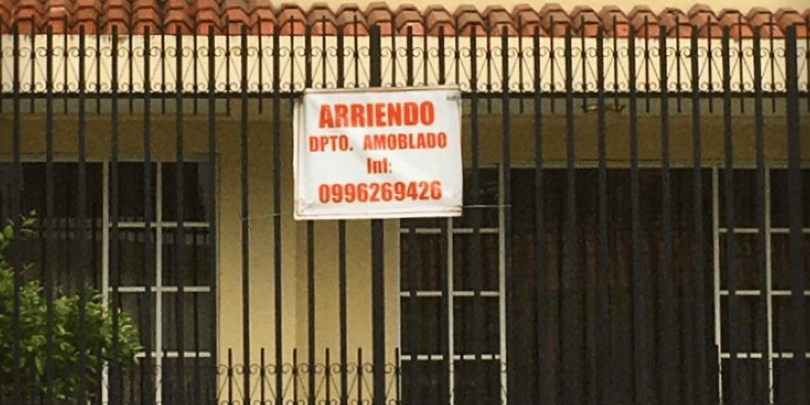
The short answer is: you do! Home and personal security are all relative concepts, and they don’t all come down to 24-hour security or electric fences. Rather, it depends on your own attitude and approach to personal security. If you’re careless and not paying attention to what’s going on around you, you run the risk of becoming another victim.
You might be surprised to discover that there are more break-ins and muggings in the areas where “rich foreigners” live than in some of the so-called “rougher” neighborhoods. And that makes perfect sense because thieves go where all the money and the “good stuff” is.
Of course, there are many neighborhoods that are inherently safer, especially a gated community, called an urbanización. In my opinion, these are probably the safest places to live in Cuenca.
In short, there are zero “crime-free” neighborhoods in Cuenca. Even the best and brightest parts of town can (and do) attract the wrong people. But in general, your risk is greater in areas that are poorly lit or lightly traveled. In other words, the fewer people on the street and the less light there is, the more likely you’ll want to avoid choosing a home on that stretch of road. I’ll go into much more depth on security in my upcoming article on evaluating rental properties, but for now, you simply need to realize that home security requires that you make the right choices and remain vigilant.
Other Neighborhood Considerations
As you’ve hopefully discovered while reading this article, evaluating and choosing the right neighborhood is nearly as important as the house or apartment that you end up renting. Both are big decisions, and both (if not done thoughtfully) can lead to a lot of heartache and another move. Here are a handful of additional things you should take into consideration when choosing a home in the Cuenca area:
Hilly Areas
The hilliest parts of town are mostly on the northeast end of Cuenca, but they show up in other areas, too. Remember that we’re at an elevation of approximately 8,300 feet (2.530 meters), and if you’re going to live on a street with a huge incline, you’re going to be huffing and puffing a lot!! Then, if you don’t have a vehicle, just carrying a few groceries from the tienda at the bottom of the hill is going to be a real chore. Then, of course, you need to make sure you’re physically healthy enough for climbing those hills. Hilly areas also present a significant challenge in terms of drainage and subsequent damage to your home, which I’ll cover in more detail in my next article.
Tiendas and Other Shopping
One huge factor that makes Cuenca so walkable is the plethora of tiendas! Before you choose a given neighborhood, make sure that all the services you need are there, including those tiendas, reasonable access to grocery stores and/or mercados, laundry service, bakeries, etc.
Internet
Does the area you wish to live in have good options for connectivity? It’s always a good idea to physically go into your chosen internet provider’s office and show them on the map where you’ll be living. This is less of an issue than it used to be, but getting good internet service in el campo can still present certain challenges.
Access to Transportation
As I mentioned above regarding living out in the country, transportation can be a huge issue. At certain points, the city buses stop and turn around, and then the provincial buses take over. You could be standing out there for a while, trying to flag down a passing bus. Likewise, getting a taxi when you’re too far out is also a challenge, because the drivers don’t particularly enjoy driving a long distance to pick you up when they have to make half of that trip with no paying customer in the cab. Be sure to ask around and find out what transportation options are available to you if you live out in el campo.
Car Alarms
We hear them all the time here, but it’s far better to hear them faintly from a great distance! The main thing here is that wherever there is communal parking, or wherever people are forced to park on the streets, you’re going to hear a lot more alarms. Houses or apartment buildings that have secure parking are far less likely to have this issue.
Barking Dogs
Many Cuenca homes have dogs for security. The thing is, many of these dogs are either inside the house during the day, or in some cases, they’re let out to run the streets all day long. But when the sun starts to set, these dogs begin to magically appear in the yards of your potential future neighbors, and they typically bark, on and off, all night long. They bark at anything that moves. They bark at strangers. They bark at each other. The only real way to know if this will be a problem in the area you’re considering is to return in the evening and walk around the entire block where you’re thinking of living. If the dogs are there, you’ll hear them. From there, it’ll be up to you as to whether or not you’ll be able to endure the nonstop yapping.
The Zone of Tolerance
Yes, prostitution is legal in Cuenca, but only in one certain area referred to as the Zone of Tolerance. This is an area just off of Las Americas, not too far up the road from Supermaxi Las Americas. I only mention this because I’ve had about a dozen people tell me: “I found this really great house a short distance from Supermaxi and the price is excellent. What do you think about this area?” Well, of course, they didn’t know what was just around the corner from that house, and after I told them, they opted to keep looking. In short, that’s not a great area to live in, and it typically draws the kind of people that you probably don’t want meandering through your neighborhood.
Final Words
So what can you do to avoid unwittingly moving into a property that has one of these “surprises” waiting for you? Allow me to repeat what I’ve suggested a few times already, and go back to the neighborhood and the property you’re considering moving to at least two or three times, at different hours of the day. Neighborhoods can change dramatically from the morning to the afternoon, and from afternoon to evening. At a minimum, go back and visit the property in the early morning (on a weekday), maybe between about 8:00 – 9:00 am. Then go back in the evening between 7:00 – 9:00 PM. Get out there and walk around the block. What do you see and hear? This little trick can potentially save you a lot of headaches and distress.
If you’re concerned that the owner is going to rent the property out from under you while you’re doing all this reconnoitering, you can always offer 50% of the deposit, along with a written agreement that you will be inspecting the house and the property before signing a lease, and that you will be making the ultimate decision, based on your findings. You’ll need to specify the amount of time that you’ll require to inspect the area, and the written agreement should state that if you find anything that makes the property unsuitable for you, you will get a full refund of your deposit, leaving you free to keep looking. Of course, you’ll need to keep this time short, between 24 – 72 hours. But try to keep this time relatively short, because you’re essentially preventing anyone else from renting the property while you’re evaluating the neighborhood.
I hope I’ve shown you that finding a new home here requires a lot more than just the house or apartment itself. Even the coolest and most comfortable house out there is only as cool and comfortable as the neighborhood you choose to live in. And when considering neighborhoods in Cuenca, remember that things can change drastically from one block to the next. I can’t guarantee that I’ve covered everything here in this article, but I do know that the points I’ve made are a valid and important part of choosing where to live. I’ve written another article on evaluating the house or apartment itself, and another on lease considerations. Both of these can save you a lot of grief if followed properly. Stay tuned!
===
If you enjoyed Jeff’s article, we suggest joining his Facebook Group for more quality insights.
Need help finding your next house or apartment to rent? View YapaTree’s current listings or submit your preferences here to get started.

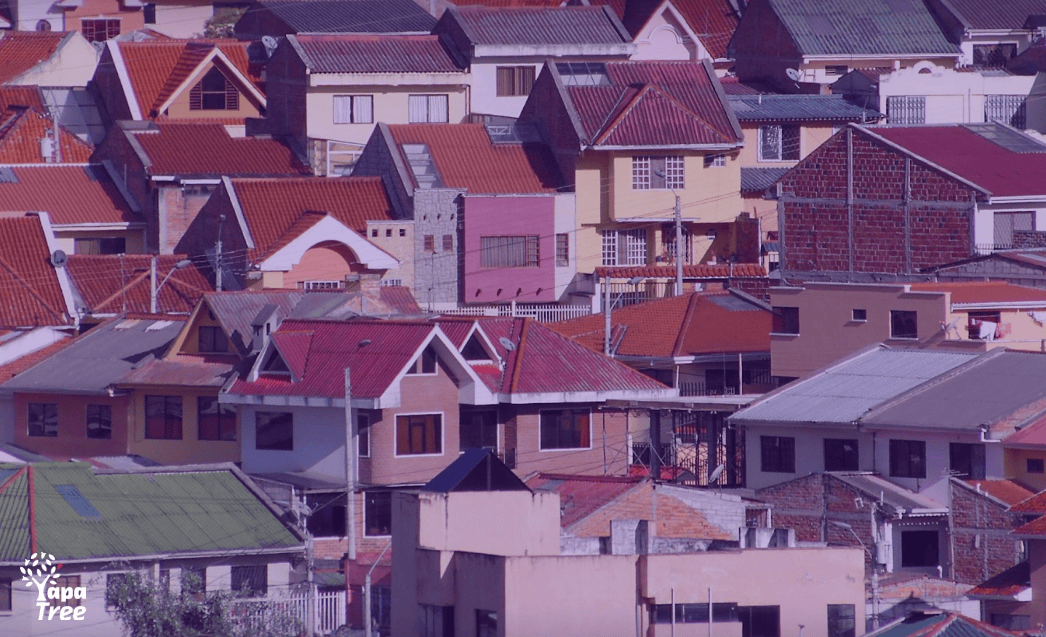




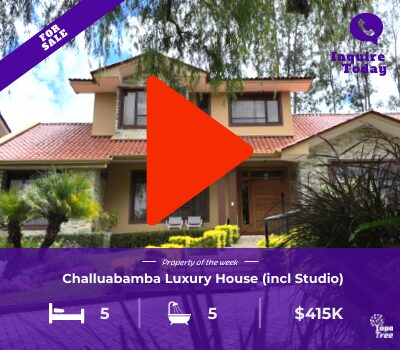



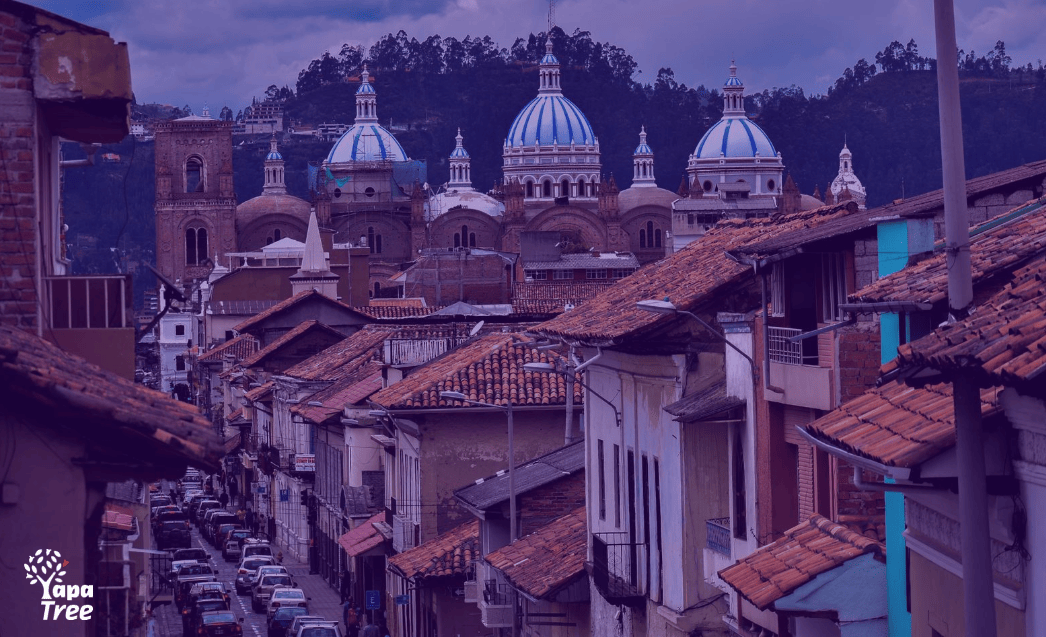
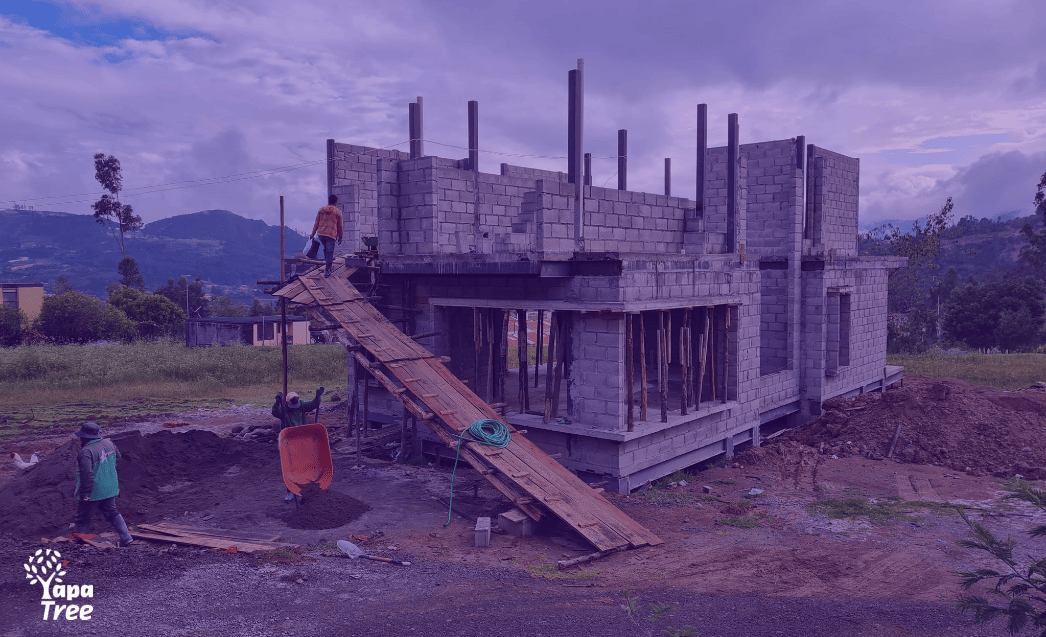

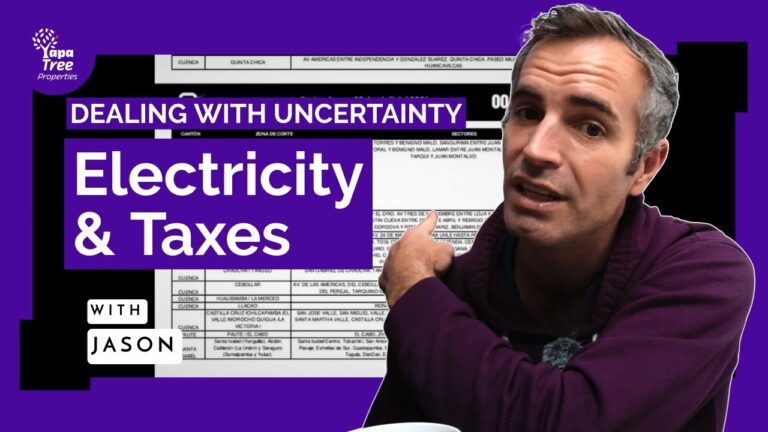

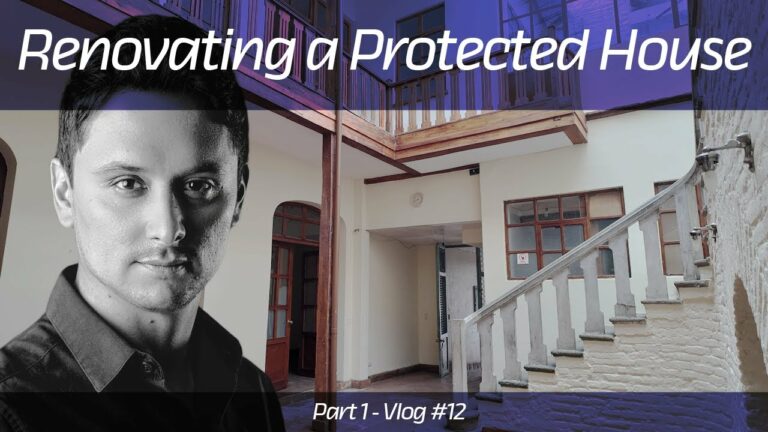

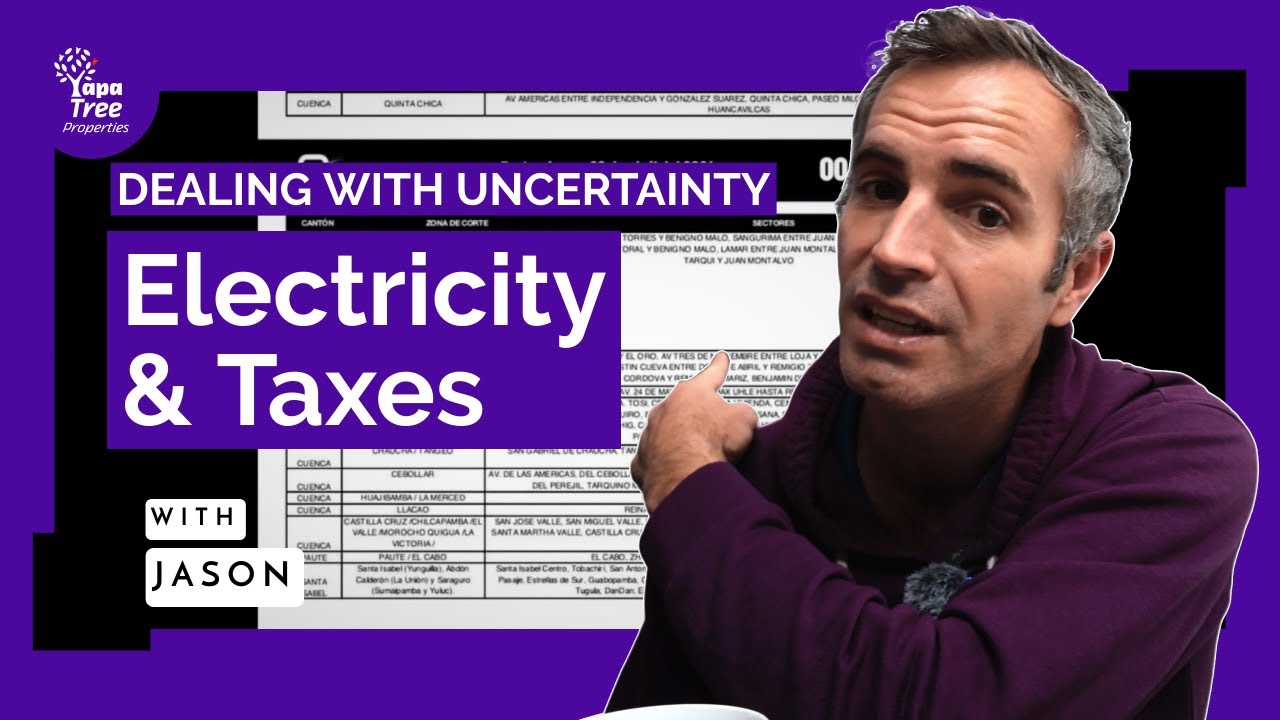

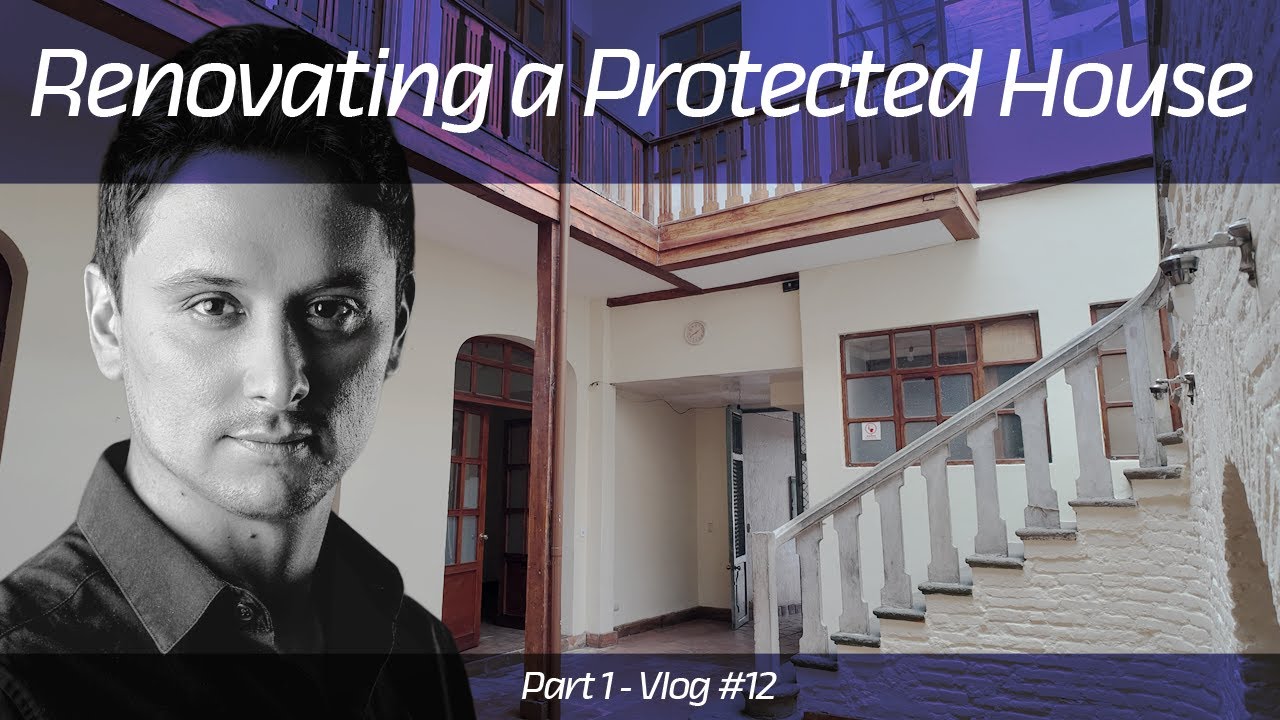
5 Responses
There are neighborhoods out there where none of these nightmares occur. Possibly one problem in finding them is that they are usually owner occupied, which implies you need to be an owner. After 12 or so years owning our house, which is in a very boring, nondescript neighborhood, (but I suspect considered upper middle class), it is clear that our neighbors would not put up with any of the nonsense that I just read about in Jeff’s article.
I know I know, renting is cheap, but there are reasons, the biggest being you are at the mercy of the whims of a landlord, think breaking leases, selling the house you are in, lack of maintenance, little control over who moves next door,rent increases, and many others. Also, you really have no control of the house itself, inside or outside. Most people would not want to renovate a rental for instance, or put any significant improvements into it (and neither do the landlords btw). If you own, that all goes out the window. For us at least, buying was a very sensible option. And oh yeah, my monthly expense is about $60 electric and water.
Unfortunately, buying isn’t an option for most expats. Banks are very reluctant to loan that much money to a foreigner, and most of us don’t have enough stashed away to pay cash. Also, I’ve lived in (and explored) neighborhoods where most every house is owner-occupied, and with the exception of very upscale neighborhoods, home-ownership makes very little difference when it comes to matters of noise. Besides that, this article was written especially for those who have no option but to rent, and to assist them with “heading off” most of the annoying, neighborhood-related factors that can make daily life difficult in a given location.
This is a great article, Jeff, and thank you so much for taking the time to help out expats with this perspective. It’s more helpful than you know! I actually printed this one! It’s a keeper.
The thing that has me reluctant to buy is that there’s still no guarantee that things in your neighborhood won’t change. We rented a great house when we first arrived, and I often thought I would buy it at the right price if our landlord ever wanted to sell. (My husband felt otherwise since it didn’t have a first floor master, but… moot point now.) That changed when the neighbors on the next street over decided to add a third floor to their two-story house, eliminating a decent view from a once-lovely third floor terrace at our place. The neighbor never did any finishing work to that addition. They just left raw concrete block on display. And this is in a very nice neighborhood. If I owned that house, I would be very disappointed. As a renter, it wasn’t as big a deal. But I’m always aware that the perfect house is only perfect as long as nothing changes in the neighborhood. That’s what keeps me renting for now.
Thanks Bill. This is actually great advice: “I know I know, renting is cheap, but there are reasons, the biggest being you are at the mercy of the whims of a landlord, think breaking leases, selling the house you are in, lack of maintenance, little control over who moves next door,rent increases, and many others.”
I never really looked at it this way. Renting is risky here in the US too but you have a better knowledge of everything than moving to a new country. I didn’t consider buying because of dollars and sense at my age but peace of mind is worth far more and this may really be a way to go. I really appreciate you providing this perspective here.